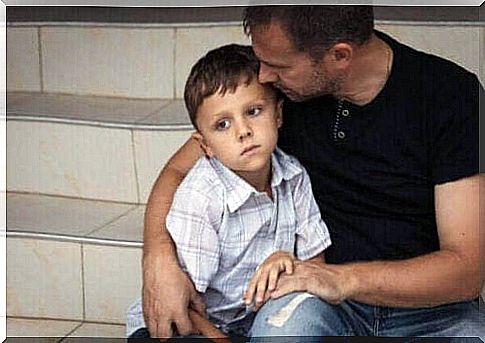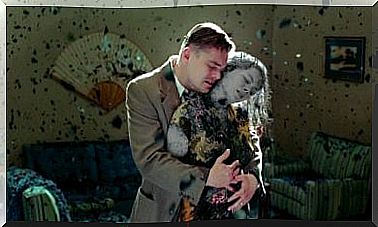Four Subtle Forms Of Psychological Abuse

Subtle forms of psychological abuse are often difficult to detect. They can be dangerous due to their seemingly harmless nature. These types of behaviors gradually undermine the victims and leave negative emotional harm. So what forms are we talking about?
Today’s article will discuss four subtle forms of psychological abuse that can occur in all types of relationships. You will also read about the signs that can help you identify them, paying special attention to the consequences for the victims.
Subtle forms of psychological abuse
It is common for the most obvious forms of psychological abuse to receive the most attention. However, the subtle forms are often hidden, ambiguous, and thus those who are exposed to them may be more tolerant in their interpretation of the aggressive party’s intentions. Thus, it is often believed that the aggressive party is willing to help.
Research suggests that subtle forms of psychological abuse are much more common than others that leave clearer signs, such as physical abuse. In addition, the damage caused by these subtle forms can become deeper in the long run.

The difficulty of identifying the aggression, the repressed emotions and the silence they create does not lead to an intervention until after a long time. Therefore, it becomes more difficult to get out of the situation, or to turn it around.
Subtle forms of psychological abuse can come in the form of “harmless” comments. Others come as criticism, humiliation, blackmail and attempts to control the victim. This type of aggression can occur in different contexts, for example in a romantic relationship, between parents and children, and also in other types of relationships, such as friendship.
One of the characteristics of subtle forms of psychological abuse is also that they generate specific feelings and impressions in the victim. In general, they make them feel unworthy of love, guilty of negative situations, and they may even develop a severe disregard for their own well-being.
The silent treatment
This is a subtle form of abuse. Its actions aim to ignore the victim by not talking to them and acting as if they are not even there. This is disguised blackmail and the attacker does not cease to be indifferent until the other person gives in to his wishes.
The silent treatment reveals the attacker’s emotional immaturity and their poor communication skills. The consequences for their victims can be quite detrimental. This is because being ignored leads to feelings of fear, sadness, anger and above all anxiety. The victims blame themselves for the situation; they do not understand why they are treated that way.
2. Gaslighting
Gaslighting is another of these subtle forms of psychological abuse, perhaps the most subtle of them all. The term comes from the English title of the film Gasljus , with Ingrid Bergman: Gaslight . Its main characteristic is that the aggressor makes his victim doubt his own judgment and even his own perception or memories of certain events.
In this form of blackmail, the aggressor refers to the fact that the victim has imagined or exaggerated certain situations he has experienced, either consciously or unconsciously. Thus, the victim will stop defending his position in an argument as he begins to doubt whether things really happened the way he remembers them. This situation is usually repeated over time and seriously damages the victim’s self-confidence. The victim finds himself in a situation of extreme vulnerability towards his oppressor.
The consequences of these subtle forms of abuse include strong feelings of dependence, feelings of depersonalization and loss of control. Victims of gaslighting often talk about feelings of going crazy or losing control of their lives.
3. Overprotection
This has nothing to do with protecting anyone. In fact, the care provided has a limiting effect on the victims of these subtle forms of psychological abuse. In other words, this “protection” is detrimental to the victim’s autonomy and is a careless form of parental-like behavior.
Overprotection occurs in many forms: from a low capacity to set clear boundaries to to veto the victim’s initiative or to subject them to all forms of trial. The consequences of these actions create feelings of fear in the victim, an addiction to their oppressors and a low tolerance for frustration. As you can imagine, it limits the victim’s everyday life.
4. The loyalty conflict
This is a form of abuse that can occur in different contexts. But it usually happens in separated couples with children in common. Some separated parents do their best to gain a child’s unconditional loyalty. Of course, loyalty to one means disloyalty to the other.
It is common for parents to devalue their partner in front of their children, place the child in the role of judge or make them feel guilty for having met their other parent.
The consequences of this type of abuse in children are associated with anxiety, somatization and can seriously jeopardize their emotional stability.

Subtle forms of psychological abuse, a little at a time
Subtle forms of psychological abuse are characterized by ambiguity. However, they are more common than other, more notorious types of abuse. They can also lead to very harmful effects on a victim in the long run. These conditions can worsen the victim’s prognosis.
In summary, the silent treatment is based on behaviors that aim to ignore the victim in order to manipulate their behavior. In the same way , gaslighting reduces a person’s self-confidence. These subtle forms of abuse, common in romantic relationships, lead to fear, anger and anxiety in the victims.
Overprotection and loyalty conflicts are more common in family contexts between parents and children. Parents create protective behaviors that limit their children’s autonomy and make them feel helpless. This type of abuse is usually perpetrated by parents who pressure children to choose their side.
Subtle forms of psychological abuse are like drops falling repeatedly on a rock. In other words, it is a collection of small documents. They would not cause damage on a single occasion, but can do a lot of damage when someone maintains them over time.
The greatest risk with these toxic behaviors lies in the difficulty of identifying them. Therefore, knowledge and awareness of them is among the most important aspects to prevent them.









